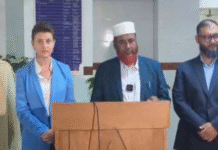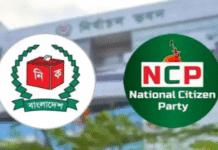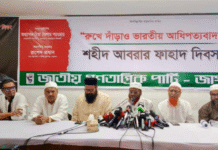Two leaders talk for 37 minutes; fail to set date, agree on contents of talks
Prime Minister Sheikh Hasina finally made a phone call to her archrival Khaleda Zia yesterday and invited her to hold talks on the next parliamentary election. But the possibility of a dialogue between the two leaders still hangs in balance, as they couldn’t reach a consensus on the date and the agenda of their parley.
Hasina urged Khaleda to hold talks at her official residence Gono Bhaban on Monday. But the opposition leader turned down her offer, and said she could only join talks after the BNP-led 18-party alliance’s 60-hour shutdown ends on October 29 evening.
During the 37-minute conversation, the prime minister offered her counterpart to have a discussion on the formation of an all-party election-time government that Hasina had proposed in her address to the nation on October 18.
“You know, I have been holding talks with different political parties. I invite you to Gono Bhaban to discuss the upcoming election and have dinner with me,” Hasina told Khaleda over the phone.
In response, Khaleda said the nation rejected Hasina’s formula, and the opposition leader made a counter proposal on October 21 for having a discussion on the formation of a non-partisan polls-time government.
“If you first agree in principle to hold the next general election under a non-partisan polls-time government, then we will call off all our agitation programmes as well as the 60-hour hartal. And we will sit for dialogue to discuss how to form the polls-time government,” Khaleda’s Press Secretary Maruf Kamal Khan, quoted the BNP chief as saying to Hasina.
Speaking at a press conference just after the premier’s phone call to the opposition leader, he said the BNP chief told Hasina that they could have discussions on an election-time government by making necessary changes (inclusions and exclusions) to their proposals.
In response, Hasina told Khaleda that she would inform the latter about the matter after consulting with her party’s senior leaders.
Khaleda’s condition for talks may remind people about Hasina’s stance during the 1995 political crisis over the election-time government. A group of five eminent citizens had initiated a move to engage the then ruling BNP and the opposition AL in talks to resolve the crisis.
Following their persuasion, the then premier Khaleda wrote to Hasina urging her to sit to find out a solution to all problems over the forthcoming elections.
Khaleda also offered that the talks could be held at the prime minister’s office or at the parliament chamber of the leader of the House.
In response, Hasina laid down a condition that Khaleda first accepted the concept of a non-party caretaker government system to create conducive atmosphere for dialogue.
“We can meet anywhere any time once the atmosphere for a dialogue is created,” Hasina wrote to Khaleda.
But the talks between the two top leaders were not held, as they both remained stuck to their positions.
The prime minister finally called the opposition leader five days after she told a cabinet meeting that she would phone her counterpart. Her announcement drew huge attention from all sections of people amid a hope that the two leaders will hold talks to resolve the ongoing political crisis over the polls-time government.
UN Chief Ban Ki-moon called Hasina and Khaleda at the end of August and urged them to hold talks to find a peaceful resolution to the political deadlock.
A number of foreign diplomats stationed in Dhaka have also made hectic efforts to see a dialogue take place between the ruling and opposition parties.
Source: The Daily Star










